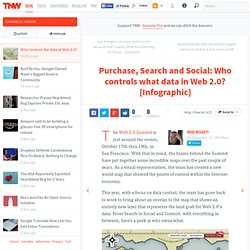

Funding Cuts Threaten Big Data. Reduced support from the US National Library of Medicine threatens to shut down five popular biological databases.
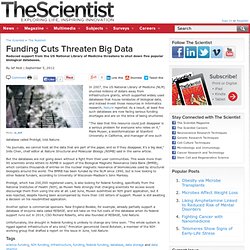
Flickr, re_birf In 2007, the US National Library of Medicine (NLM) shunted millions of dollars away from infrastructure grants, which supported widely used databases that house terabytes of biological data, and instead invest those resources in informatics research, Nature reported. As a result, at least five such databases are now facing serious funding shortages and are on the brink of being shuttered. “The idea that this resource could just disappear is a serious problem for everyone who relies on it,” Mark Musen, a bioinformatician at Stanford University in California, and manager of one such database called Protégé, told Nature. “As journals, we cannot host all the data that are part of the paper, and so if they disappear, it’s a big deal,” Inês Chen, chief editor at Nature Structural and Molecular Biology (NSMB) said in the same article.
Data Driven: Improving Business and Society Through Data. How Authoritarianism Will Lead To The Rise Of The Data Smuggler. Dave McCrory has developed the concept of data gravity.
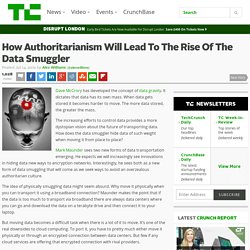
It dictates that data has its own mass. When data gets stored it becomes harder to move. The more data stored, the greater the mass. The increasing efforts to control data provides a more dystopian vision about the future of transporting data. How does the data smuggler hide data of such weight when moving it from place to place? Mark Maunder sees two new forms of data transportation emerging. The idea of physically smuggling data might seem absurd. But moving data becomes a difficult task when there is a lot of it to move. Maunder tells a story about a conversation with Sebastian Thrun, the creator of Google Street Maps. He also refers to encryption laws passed in the United Kingdom that allows authorities to demand an individual’s encryption keys. What will come of this? The Fragmented Mobile Information Race.
Mobile devices are shifting many individual computing behaviors, perhaps none more significant than how we search for and receive information.
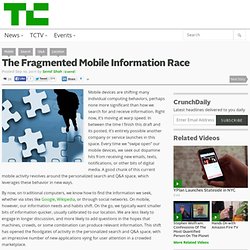
Right now, it’s moving at warp speed. In between the time I finish this draft and its posted, it’s entirely possible another company or service launches in this space. Every time we “swipe open” our mobile devices, we seek out dopamine hits from receiving new emails, texts, notifications, or other bits of digital media. A good chunk of this current mobile activity revolves around the personalized search and Q&A space, which leverages these behavior in new ways. 10 ways big data changes everything. Bandwidth Bottlenecks Stifle Pervasive Networks. If pervasive networks, cloud computing and big data are going to deliver on their promise - to make increasingly vast quantities of information always available and understandable - something is going to have to be done about existing network architecture bottlenecks.
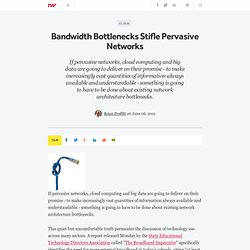
This quiet but uncomfortable truth permeates the discussion of technology use across many sectors. A report released Monday by the State Educational Technology Directors Association called "The Broadband Imperative" specifically identifies the need for more external broadband in today’s schools, citing “at least 100Mbps per 1,000 students/staff” as a 2014-15 school year target, and 1Gbps per 1,000 students/staff for the 2017-18 academic year. The report called for even higher internal networking specs: The minimum internal WAN connections between schools and the district should be 1Gbps/1,000 for 2014-15, and 10Gbps/1,000 for the 2017-18 target.
Most schools, of course, don’t even approach those speeds. How big data will change networking — Cloud Computing News. As unstructured data heats up, will you need a license to webcrawl? — Cloud Computing News. Tim O'Reilly on the Future of Location: "The Guy with the Most Data Wins" McKinsey Says Big Data Can Change The Way Business Operates. What’s Ruining the Data on Government Websites? Here’s an idea to make government websites better: Stop listening.
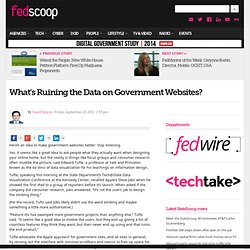
Yes, it seems like a good idea to ask people what they actually want when designing your online home, but the reality is things like focus groups and consumer research often muddle the picture, said Edward Tufte, a professor at Yale and Princeton known as the da Vinci of data visualization for his teachings on information design. Tufte, speaking this morning at the State Department’s Tech@State Data Visualization Conference at the Kennedy Center, recalled Apple’s Steve Jobs when he showed the first iPad to a group of reporters before it’s launch. When asked if the company did consumer research, Jobs answered, “It’s not the user’s job to design the stinking thing.”
(For the record, Tufts said Jobs likely didn’t use the word stinking and maybe something a little more authoritative.) “Feature-itis has swamped more government projects than anything else,” Tufts said. “Our eyes will find what it’s looking for,” Tufte said. Who controls the data in Web 2.0? 25 September '11, 08:25pm Follow The Web 2.0 Summit is just around the corner, October 17th thru 19th, in San Francisco.
